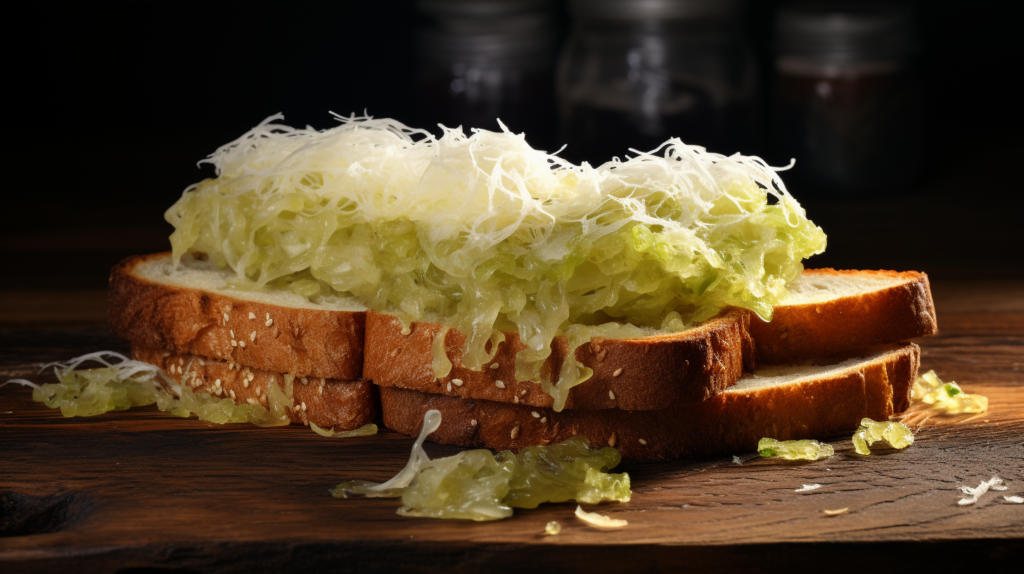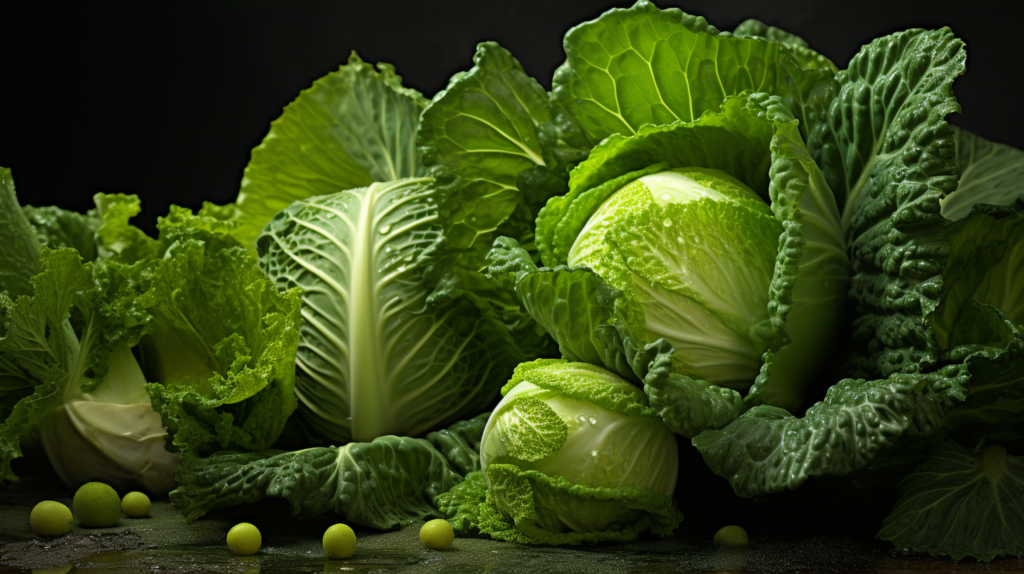Are you looking for a natural way to improve your digestion and gut health? If so, sauerkraut may be the solution you’ve been searching for. This probiotic-rich food has been used for centuries to support digestive function and overall wellness.
By incorporating sauerkraut into your diet, you can unlock a range of benefits for your gut health, including improved nutrient absorption, reduced inflammation, and enhanced immune function. In this article, we will explore the incredible benefits of sauerkraut for digestion and gut health.
Key Takeaways
- Sauerkraut is a probiotic-rich food that can improve digestion and gut health.
- Consuming sauerkraut regularly can enhance nutrient absorption, reduce inflammation, and improve immune function.
- Sauerkraut is a natural source of probiotics, which are live bacteria and yeasts that promote a healthy balance of gut flora.
- In addition to its probiotic content, sauerkraut is a good source of essential nutrients like vitamins C and K and fiber.
- When selecting sauerkraut, opt for the unpasteurized variety made using traditional fermentation methods for the highest probiotic benefits.

The Power of Probiotics for Gut Health
If you’re looking for a natural way to improve your gut health, sauerkraut may be the answer. This humble food is packed with probiotics – live bacteria and yeasts that are essential for a healthy gut. Consuming sauerkraut regularly can help support the balance of good bacteria in your gut, leading to better digestion and overall wellness.
The Benefits of Probiotics
Probiotics are essential for maintaining a healthy balance of gut flora. They help keep harmful bacteria in check, strengthen the immune system, reduce inflammation, and improve nutrient absorption. When the balance of bacteria in the gut is disrupted, it can lead to a variety of digestive issues, including bloating, constipation, and diarrhea.
Sauerkraut is a natural source of probiotics, making it an excellent addition to your diet. When cabbage is fermented, lactic acid bacteria are produced, which helps to preserve and add flavor to the food. These beneficial bacteria can help support a healthy balance of gut flora when consumed.
Probiotic-Rich Sauerkraut
Not all sauerkraut is created equal. To reap the benefits of probiotics, look for unpasteurized sauerkraut. Pasteurization can destroy the beneficial bacteria present in sauerkraut, diminishing its probiotic content. Additionally, you’ll want to look for sauerkraut that is made using traditional fermentation methods for the highest probiotic benefits.
Probiotic-rich sauerkraut can help improve digestion, reduce inflammation, and strengthen the immune system. It may also alleviate symptoms of digestive disorders, such as irritable bowel syndrome (IBS).
Incorporating Probiotic-Rich Sauerkraut into Your Diet
Adding sauerkraut to your diet is easy and versatile. You can enjoy it as a condiment, incorporate it into salads or sandwiches, or even use it as a topping for cooked dishes. Experiment with different recipes to find enjoyable ways to include sauerkraut in your meals.
Remember to start with small amounts if you are new to fermented foods, to allow your body to adjust. You can gradually increase the amount over time to make the most of sauerkraut’s benefits. And, of course, be sure to store sauerkraut properly in the refrigerator to maintain its freshness and probiotic content.

Understanding Digestive Health
Your digestive health is crucial to your overall well-being. When your digestive system is functioning optimally, you experience better nutrient absorption, reduced inflammation, and improved overall health.
Fermented foods, like sauerkraut, can contribute to better digestive health. The process of fermentation creates beneficial bacteria that can help support optimal digestion and overall wellness.
Sauerkraut for Digestion
Sauerkraut contains probiotics that can benefit your digestive system. Probiotics are live bacteria and yeasts that support a healthy balance of gut flora. Consuming sauerkraut regularly can help increase the population of good bacteria in your gut, supporting optimal digestion.
Fermented Foods and Digestion
Sauerkraut is not the only fermented food that can improve your digestion. Other examples include kimchi, kefir, and yogurt. Incorporating a variety of fermented foods into your diet can further support digestive health.
Fermented foods contain enzymes that aid in the breakdown of food, making it easier for your body to extract nutrients. They also help to strengthen the gut barrier, which prevents harmful substances from entering the bloodstream.
However, it is important to note that not all fermented foods are created equal. While some, like sauerkraut, contain beneficial bacteria, others may not. It’s important to choose high-quality fermented foods to reap the most benefits for your digestive health.

The Benefits of Sauerkraut for Gut Health
Sauerkraut is a probiotic-rich food that offers numerous benefits for gut health. By incorporating sauerkraut into your diet, you can experience improved digestion, reduced inflammation, and enhanced overall wellness. Here are some of the key benefits of sauerkraut for gut health:
| Benefit | Description |
|---|---|
| Restores gut bacteria balance | The probiotic content in sauerkraut helps promote a healthy balance of gut bacteria, which can enhance digestion and alleviate symptoms of digestive disorders such as IBS. |
| Supports gut barrier function | Sauerkraut helps strengthen the gut barrier, reducing the risk of harmful substances entering the bloodstream and promoting a healthy immune system. |
| Aids in nutrient absorption | Sauerkraut contains natural enzymes that can aid in the breakdown of food, making it easier for your body to extract nutrients and support optimal digestion. |
| Increases population of beneficial bacteria | The Lactobacillus bacteria found in sauerkraut is known to be beneficial for gut health and can help increase the population of these important bacteria in your gut. |
Incorporating sauerkraut into your diet can also provide other health benefits beyond gut health. Sauerkraut is packed with essential nutrients, including vitamins C and K and fiber, which can support overall wellness.
Remember, when selecting sauerkraut, opt for the unpasteurized variety to maintain its probiotic content. Incorporating a variety of fermented foods like sauerkraut, kimchi, kefir, and yogurt into your diet can further support digestive health. However, it’s important to note that sauerkraut may not be suitable for everyone, and it’s wise to start with small amounts if you’re new to fermented foods.
Overall, the benefits of sauerkraut for gut health are undeniable. By adding this flavorful food to your diet, you can unlock the transformative power of probiotics and experience optimal digestive function and improved overall wellness.
Sauerkraut and Digestive Enzymes
For optimal digestion, your body relies on digestive enzymes to break down the food you consume into smaller molecules that can be absorbed and utilized. Without adequate enzymes, undigested food particles can cause gut inflammation, leading to digestive discomfort and other health issues.
Sauerkraut contains natural enzymes that can aid in the breakdown of food and support optimal digestion. These enzymes include:
| Enzyme | Function |
|---|---|
| Protease | Breaks down proteins into amino acids |
| Amylase | Breaks down carbohydrates into simple sugars |
| Lipase | Breaks down fats into fatty acids and glycerol |
By including sauerkraut in your diet, you can help support your body’s natural digestive process and improve nutrient absorption.
Tip: Try adding sauerkraut to your meals that contain high-fat foods like meats or cheeses, as the lipase enzyme in sauerkraut can help break down the fat, making it easier to digest.

Strengthening the Gut Barrier
The gut barrier is a protective lining that separates the contents of your digestive tract from the rest of your body. It plays a crucial role in preventing harmful substances, such as toxins and bacteria, from entering the bloodstream.
When the gut barrier is compromised, it can lead to inflammation, autoimmune disorders, and other health issues. Fortunately, adding sauerkraut to your diet can help strengthen the gut barrier and promote a healthy immune system.
“The gut barrier plays a crucial role in overall health and wellness. By consuming probiotic-rich foods like sauerkraut, you can help enhance the integrity of the gut barrier and prevent harmful substances from entering the bloodstream.”
Sauerkraut contains Lactobacillus bacteria, which can help restore and maintain a healthy balance of gut bacteria. This can further enhance the function of the gut barrier and reduce the risk of digestive disorders.
| Gut Benefits of Sauerkraut | How Sauerkraut Benefits the Gut Barrier |
|---|---|
| Improved digestion | By promoting a healthy balance of gut bacteria, sauerkraut can enhance the function of the gut barrier and prevent harmful substances from entering the bloodstream. |
| Reduced inflammation | Strengthening the gut barrier can help reduce inflammation and support optimal immune function. |
| Alleviates symptoms of digestive disorders | A strong gut barrier can help alleviate symptoms of digestive disorders such as irritable bowel syndrome (IBS) and leaky gut syndrome. |
By incorporating sauerkraut into your diet, you can help strengthen the gut barrier and promote optimal digestive function. Remember to choose the unpasteurized variety for the highest probiotic benefit, and gradually increase your intake over time to allow your body to adjust.
Boosting Beneficial Gut Bacteria
Sauerkraut contains a variety of beneficial bacteria, including Lactobacillus, which can help promote a healthy balance of gut flora. Consuming sauerkraut regularly can help increase the population of these beneficial bacteria in your gut, supporting optimal digestion and overall wellness.
In fact, a study published in the Journal of Applied Microbiology found that consuming sauerkraut increased the number of Lactobacillus bacteria in the intestinal tract of participants.
| Beneficial Bacteria Found in Sauerkraut: |
|---|
| Lactobacillus plantarum |
| Lactobacillus brevis |
| Lactobacillus coryniformis |
| Lactobacillus rhamnosus |
| Leuconostoc mesenteroides |
By boosting the population of these beneficial microorganisms, sauerkraut can enhance your digestion, reduce bloating, and alleviate symptoms of digestive disorders such as irritable bowel syndrome (IBS).
Sauerkraut’s Nutritional Profile
Besides being a natural source of probiotics, sauerkraut is also packed with essential nutrients that support overall health and well-being. Just one cup of sauerkraut provides:
| Nutrient | Amount | % Daily Value* |
|---|---|---|
| Vitamin C | 35.5 mg | 59% |
| Vitamin K | 23.5 mcg | 29% |
| Fiber | 4 grams | 16% |
| Sodium | 939 mg | 39% |
| Iron | 1.5 mg | 8% |
*Based on a 2,000 calorie diet
Vitamin C is essential for immune system function and collagen formation, while vitamin K plays a crucial role in blood clotting and bone health. Fiber is important for maintaining regular bowel movements and supporting a healthy gut microbiome. Additionally, sauerkraut is naturally low in calories, making it a great addition to a balanced diet.
Next time you enjoy a serving of sauerkraut, remember that you’re not only getting the benefits of probiotics but also a healthy dose of essential nutrients.

Tips for Incorporating Sauerkraut into Your Routine
Adding sauerkraut to your diet is an easy and delicious way to support better digestive health. Here are some tips on how to incorporate sauerkraut into your routine:
- Use sauerkraut as a topping for sandwiches or burgers.
- Add sauerkraut to salads for an extra crunch and tangy flavor.
- Mix sauerkraut into scrambled eggs or omelets for a flavorful breakfast.
- Use sauerkraut as a condiment for grilled meats or sausages.
- Experiment with different recipes to find enjoyable ways to include sauerkraut in your meals.
Remember to start with small servings and gradually increase the amount over time to allow your body to adjust to the probiotic-rich food. Proper storage is also essential to maintain sauerkraut’s freshness and probiotic content. Keep it in an airtight container in the refrigerator and consume it within a few weeks of opening.

Choosing the Right Sauerkraut
When it comes to sauerkraut, not all varieties are created equal. To reap the maximum health benefits, it is essential to choose the right type of sauerkraut. Here are some tips to help you make an informed decision:
Go for Unpasteurized Sauerkraut
Pasteurization is a process that involves heating the sauerkraut to high temperatures to kill harmful bacteria. While this may sound like a good thing, it can also destroy the probiotic content of the sauerkraut. The best choice is unpasteurized sauerkraut, which still contains live, beneficial bacteria. Look for products with labels indicating that they are unpasteurized.
Choose Traditional Fermentation Methods
Traditionally fermented sauerkraut is made by combining shredded cabbage and salt in a large container, and letting it sit at room temperature for several days to allow the natural bacteria to ferment the cabbage. This process produces a rich, tangy flavor and ensures that the sauerkraut is packed with beneficial bacteria. Be sure to choose sauerkraut made using traditional fermentation methods.
Look for High-Quality Ingredients
Sauerkraut should be made with just a few simple ingredients: cabbage, salt, and perhaps some spices or seasonings. Avoid sauerkraut that contains preservatives, artificial flavors, or other additives. Organic sauerkraut is a good choice, as it is made with cabbage grown without the use of harmful pesticides or other chemicals.
Consider Your Taste Preferences
Sauerkraut comes in many different flavors and varieties, so it is worth experimenting to find one that you enjoy. Some sauerkraut is quite sour, while others are milder and more palatable. You may also want to try sauerkraut with added spices or seasonings, such as caraway seeds or garlic.
By following these tips, you can select the sauerkraut that is best suited to your taste and nutritional needs. Incorporating this probiotic-rich food into your diet can bring numerous health benefits, including better digestion, improved gut health, and more.
Other Fermented Foods for Gut Health
Sauerkraut is not the only fermented food that can benefit your digestion and gut health. Incorporating a variety of fermented foods into your diet can help diversify your gut microbiome and promote optimal digestive function. Here are some other fermented foods you can try:
| Fermented Food | Description |
|---|---|
| Kimchi | A traditional Korean dish made from fermented vegetables, often including napa cabbage, radish, and scallion. |
| Kefir | A fermented milk drink made by inoculating milk with kefir grains, which contain a variety of beneficial bacteria and yeasts. |
| Yogurt | A dairy product made by fermenting milk with specific strains of bacteria, including lactobacillus and bifidobacterium. |
| Kombucha | A fermented tea drink made by introducing a symbiotic culture of bacteria and yeast (SCOBY) to sweetened tea. |
| Miso | A paste made from fermented soybeans that is often used as a flavoring in Japanese cuisine. |
Like sauerkraut, these fermented foods offer probiotic benefits that can help improve your digestive health. However, it’s important to note that some fermented foods, such as kombucha, may contain higher levels of sugar or caffeine, so it’s essential to read labels and consume them in moderation.
Potential Side Effects and Precautions
While sauerkraut offers numerous health benefits, it is important to exercise caution when consuming this probiotic-rich food, particularly if you have a compromised immune system or are taking certain medications. Before adding sauerkraut to your diet, consult with your healthcare provider to ensure it is safe for you to consume.
Additionally, some individuals may experience digestive discomfort when consuming sauerkraut. This is due to the fermentation process, which can create gas in the digestive system. Start with small servings of sauerkraut if you are new to fermented foods and gradually increase the amount over time to allow your body to adjust.
If you experience any adverse side effects after consuming sauerkraut, such as bloating, diarrhea, or abdominal pain, discontinue use immediately and consult with your healthcare provider.
It is also important to choose the right type of sauerkraut when incorporating it into your diet. Opt for unpasteurized sauerkraut that has been traditionally fermented to ensure maximum probiotic benefits. Always store sauerkraut in the refrigerator to maintain its freshness and potency.

Conclusion
By adding sauerkraut to your diet, you can improve your gut health and unlock better digestion. Sauerkraut is a natural source of probiotics, which are essential for maintaining a healthy balance of gut bacteria. The benefits of sauerkraut include reducing inflammation, alleviating symptoms of digestive disorders, and promoting a healthy immune system.
Remember to choose unpasteurized sauerkraut made using traditional fermentation methods to maximize its probiotic content. And, if you are new to fermented foods, start with small amounts and gradually increase over time. Lastly, don’t forget to store your sauerkraut properly in the refrigerator to maintain its freshness.
Tips for Incorporating Sauerkraut into Your Routine
If you’re not sure how to incorporate sauerkraut into your diet, try using it as a condiment or adding it to your salads or sandwiches. You can also try using it as a topping for cooked dishes like rice or potatoes. Be creative and experiment with different recipes to find enjoyable ways to include sauerkraut in your meals.
And remember, sauerkraut is just one example of a fermented food that can improve gut health. Other fermented foods like kimchi, kefir, and yogurt are also great options to consider.
Potential Side Effects and Precautions
While sauerkraut is generally safe for consumption, it may not be suitable for everyone. If you have a compromised immune system or are taking certain medications, consult with your healthcare provider before adding sauerkraut to your diet. Additionally, some people may experience bloating or gas when consuming sauerkraut. Start with small amounts and gradually increase over time to allow your body to adjust.
Overall, sauerkraut can offer numerous benefits for digestive health and overall well-being. So go ahead and give this delicious food a try, and see how it can transform your gut health!
FAQ
What are the benefits of sauerkraut for digestion and gut health?
Sauerkraut offers numerous benefits for digestion and gut health. Its probiotic content helps restore and maintain a healthy balance of gut bacteria, enhance digestion, reduce bloating, and alleviate symptoms of digestive disorders such as irritable bowel syndrome (IBS).
What are probiotics and why are they important for gut health?
Probiotics are live bacteria and yeasts that promote a healthy balance of gut flora. Sauerkraut is a natural source of these beneficial microorganisms, making it an excellent addition to your diet for improving gut health.
How does sauerkraut contribute to better digestive health?
Sauerkraut can contribute to better digestive health due to its probiotic content. When your digestive system is functioning optimally, you experience better nutrient absorption, reduced inflammation, and improved overall well-being.
Does sauerkraut contain digestive enzymes?
Yes, sauerkraut contains natural enzymes that can aid in the breakdown of food, making it easier for your body to extract nutrients and support optimal digestion.
How does sauerkraut strengthen the gut barrier?
Sauerkraut helps strengthen the gut barrier, a protective lining that prevents harmful substances from entering the bloodstream. By improving the integrity of the gut barrier, sauerkraut can promote a healthy immune system and reduce the risk of digestive disorders.
Does sauerkraut increase beneficial gut bacteria?
Yes, sauerkraut is rich in Lactobacillus bacteria, which are known to be beneficial for gut health. Consuming sauerkraut regularly can help increase the population of these beneficial bacteria in your gut, supporting optimal digestion and overall wellness.
What is sauerkraut’s nutritional profile?
In addition to its probiotic content, sauerkraut is packed with essential nutrients. It is a good source of vitamins C and K, as well as fiber, which can further support digestive health and overall well-being.
How can I incorporate sauerkraut into my diet?
Adding sauerkraut to your diet is easy and versatile. You can enjoy it as a condiment, incorporate it into salads or sandwiches, or even use it as a topping for cooked dishes. Experiment with different recipes to find enjoyable ways to include sauerkraut in your meals.
What should I look for when choosing sauerkraut?
When selecting sauerkraut, opt for the unpasteurized variety. Pasteurization can destroy the beneficial bacteria present in sauerkraut, diminishing its probiotic content. Look for sauerkraut that is made using traditional fermentation methods for the highest probiotic benefits.
Are there other fermented foods that can improve gut health?
Yes, sauerkraut is just one example of a fermented food that can improve gut health. Other fermented foods like kimchi, kefir, and yogurt also offer probiotic benefits. Incorporating a variety of fermented foods into your diet can further support digestive health.
Are there any potential side effects or precautions when consuming sauerkraut?
While sauerkraut is generally safe for consumption, it may not be suitable for everyone. If you have a compromised immune system or are on certain medications, consult with your healthcare provider before adding sauerkraut to your diet. Additionally, start with small amounts if you are new to fermented foods to allow your body to adjust.
How often should I consume sauerkraut to experience its benefits?
To make the most of sauerkraut’s benefits, try to consume it regularly. Start with small servings and gradually increase the amount over time. Remember to store sauerkraut properly in the refrigerator to maintain its freshness and probiotic content.














